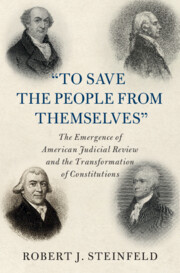 'To Save the People from Themselves'
'To Save the People from Themselves' Book contents
- “To Save the People from Themselves”
- Cambridge Historical Studies in American Law and Society
- “To Save the People from Themselves”
- Copyright page
- Dedication
- Contents
- Acknowledgments
- Introduction
- Part One Legislatures and Legislation under the First American Constitutions
- Part Two The Emergence of American Judicial Review: 1779–1787
- I The Emergence of American Judicial Review, 1779–1782
- II The Emergence of American Judicial Review, 1784–1787: Developing Judicial Review as a Check on Legislatures and on the People
- 6 The Reappearance of “Vertical” Judicial Review in the Case of Rutgersv.Waddington, New York, 1784
- 7 The Successful Battle to Establish Judicial Review in New Hampshire: The Ten Pound Act Cases, 1786–1787, and Their Aftermath
- 8 Judicial Review and Legislative Supremacy in Rhode Island: The Case of Trevett v. Weeden, 1786, and Its Aftermath
- 9 The Struggle Between Traditional Constitutionalism and the Constitution of Judicial Review in North Carolina: The Case of Bayard v. Singleton, 1786–1787, and Its Aftermath
- Part Three Judicial Review at the Federal Convention
- Index
9 - The Struggle Between Traditional Constitutionalism and the Constitution of Judicial Review in North Carolina: The Case of Bayard v. Singleton, 1786–1787, and Its Aftermath
from II - The Emergence of American Judicial Review, 1784–1787: Developing Judicial Review as a Check on Legislatures and on the People
Published online by Cambridge University Press: 17 September 2021
- “To Save the People from Themselves”
- Cambridge Historical Studies in American Law and Society
- “To Save the People from Themselves”
- Copyright page
- Dedication
- Contents
- Acknowledgments
- Introduction
- Part One Legislatures and Legislation under the First American Constitutions
- Part Two The Emergence of American Judicial Review: 1779–1787
- I The Emergence of American Judicial Review, 1779–1782
- II The Emergence of American Judicial Review, 1784–1787: Developing Judicial Review as a Check on Legislatures and on the People
- 6 The Reappearance of “Vertical” Judicial Review in the Case of Rutgersv.Waddington, New York, 1784
- 7 The Successful Battle to Establish Judicial Review in New Hampshire: The Ten Pound Act Cases, 1786–1787, and Their Aftermath
- 8 Judicial Review and Legislative Supremacy in Rhode Island: The Case of Trevett v. Weeden, 1786, and Its Aftermath
- 9 The Struggle Between Traditional Constitutionalism and the Constitution of Judicial Review in North Carolina: The Case of Bayard v. Singleton, 1786–1787, and Its Aftermath
- Part Three Judicial Review at the Federal Convention
- Index
Summary
The years 1786–87 marked a decisive turning point in the history of judicial review. Of the half dozen legal disputes that historians normally place on the list of early judicial review precedents down to the Federal Convention, fully half arose during the years 1786–1787.1 During these two years, in a variety of cases in three different states, lawyers argued on behalf of their clients that a court must declare a state statute not to be law, and in every case, the judges obliged. The North Carolina case of Bayard v. Singleton was one of these.
- Type
- Chapter
- Information
- 'To Save the People from Themselves'The Emergence of American Judicial Review and the Transformation of Constitutions, pp. 332 - 386Publisher: Cambridge University PressPrint publication year: 2021


